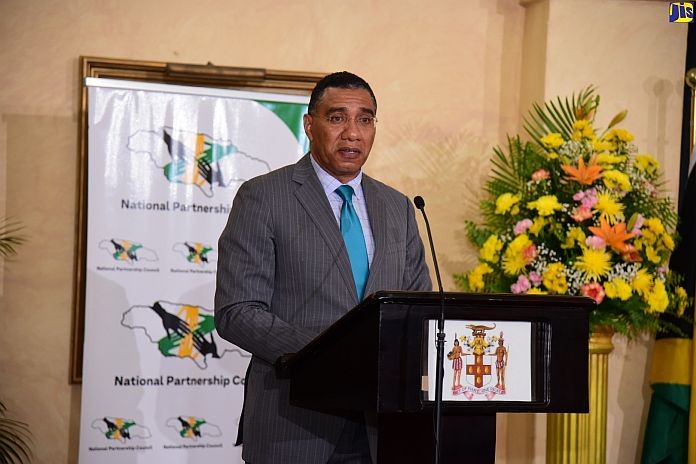By Rochelle Williams
KINGSTON, Jamaica, (JIS) – Prime Minister, Andrew Holness, has reaffirmed the government’s commitment to long-term national goals, rather than to short-term political imperatives.
“We believe and we affirm that Jamaica’s progress can be retarded by a divisive political climate and we commit to bring genuine, transparent, and accountable bipartisanship to national life,” the prime minister added. He was speaking at the signing of the Social Partnership Agreement 2022-2026 – ‘Partnership for Jamaica’s Strong and Sustainable Recovery’ – on Wednesday, September 28, at King’s House in St Andrew.
The prime minister emphasised that the government seeks to engender trust and confidence in the national processes, with due attention paid to the elimination of corruption in all its forms.
The new partnership agreement encompasses five strategic pillars of the United Nations Sustainable Development Goals (SDGs) 2030 and reflects Vision 2030 Jamaica. These are prosperity, peace, people, planet, and partnerships.
It is guided by several underlying principles – adherence to the just rule of law; respect for human rights and civil liberties of all Jamaicans; accountable, informed leadership demonstrating unimpeachable integrity; protection of the natural environment; and improvement of public health.
Other guiding principles are economic growth established on the foundation of inclusiveness, equity, and sustainability; quality education as a foundation for nation building; and individual and collective commitment to tolerance and maturity in conflict resolution.
Signatories to the agreement are the prime minister; leader of the opposition, Mark Golding; president of the Jamaica Council of Churches, Kenneth Richards; president, Jamaica Confederation of Trade Unions, Helene Davis-Whyte; and president, Private Sector Organisation of Jamaica (PSOJ), Keith Duncan.
The Social Partnership Agreement is directed by the National Partnership Council (NPC) to facilitate the engagement of respectful, constructive, and sustained dialogue on issues of national importance.
The prime minister explained that the new social partnership agreement arose out of concern about the economic and social fallout from the COVID-19 pandemic.
In his remarks, Golding affirmed his party’s commitment to being a productive and constructive partner in identifying and implementing solutions to Jamaica’s deep problems, while at the same time performing its Constitutional role of holding the government to account and defending the Constitution of Jamaica and the rights of the Jamaican people.
“We recognise that at Jamaica’s stage of development there are many things which require a national approach, a Jamaica approach as opposed to a fragmented, politicised, antagonistic or adversarial approach, and we are committed to playing our part in trying to identify what those are, as has been done in this agreement, and being constructive partners in those areas of common ground,” he said.
“Even within those areas of common ground there may be issues where we won’t always agree on, matters of detail or even matters of principle or policy, but we are committed to the idea of working together to fashion solutions in the interest of the country,” Golding added.
Meanwhile, Governor-General, Sir Patrick Allen, commended the prime minister, the leader of the opposition, and representatives of civil society, labour unions, and the private sector for carrying the process forward in the interest of the social good.
“We each have a responsibility to embrace the goals as articulated in the agreement. Let us persevere and resolve that failure will not be an option as we continue this journey of nation-building,” he said.
Members of the cabinet, parliament, the opposition, NPC, heads of agencies and departments, the private sector and representatives of civil society attended the signing ceremony.
The first partnership for Jamaica agreement, signed in July 2013, was intended to create a national dialogue and consensus on issues relating to economic growth and development.
The second agreement, the ‘Partnership for a Prosperous Jamaica’ was signed in December 2016. That agreement signalled a renewal of the previous mission and was a further commitment to the priority areas of economic growth and job creation, public-sector transformation for efficiency and effectiveness, adherence to the rule of law and enhanced tourism.
Partners of the NPC include the government, parliamentary opposition, private sector, trade unions and civil society (the church, youth, women’s, human rights and environmental group representatives).
The Partnership for Jamaica’s Strong and Sustainable Recovery agreement can be viewed at www.jis.gov.jm





